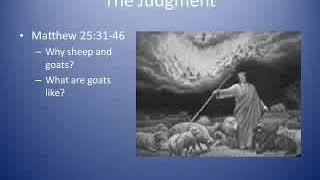The Law and Justification (Q & A)
Q. "...the Christian and the commandments... What exactly are these scriptures saying about the law: Acts 13:38, 39, Rom 7:7, Rom 3:20 Galatians 2:16, Gal 2:21, Eph 2:8-10 ?" ~ Question from Elizabeth G. on Facebook
Answer By: John Spellman
I have posted each text followed by an explanation of their meaning below:
Act 13:38 Be it known unto you therefore, men and brethren, that through this man is preached unto you the forgiveness of sins:
Act 13:39 And by him all that believe are justified from all things, from which ye could not be justified by the law of Moses.
Paul is talking to an audience of Jews and making a case that the ritual system contained in the Law of Moses could not justify anyone, but rather pointed to Christ who would one day justify those who believe. The Jewish people misunderstood the purpose of the law. They thought that by sacrificing animals and performing the rituals God had appointed them that the blood of these animals could actually justify (or make them righteous) in God’s sight. Paul points out that realistically, animal sacrifices and other rituals as mandated by the Law of Moses could never justify people. How could animal blood pay for sin? It was really a ritual that pointed forward to Jesus and His atoning blood. Nothing in the Old Testament system had power to save the soul, everything in the Jewish economy pointed forward to Christ.
This has nothing to do with the 10 Commandments, this is a reference to the rituals within the Law of Moses which many believed justified people through performance of them. For example sacrificing a goat on the Day of Atonement. Could that really justify an entire nation? Or was it symbolic of something and used as a teaching tool until it’s later fulfillment in Christ. The term “Law of Moses” in this instance and context clearly refers to a system of Jewish rights and rituals. It makes it clear that this system couldn’t make one righteous. It follows a theme that Paul writes about frequently in which he makes clear that salvation comes by grace and that it can’t be earned by keeping “the law” or in sacrifices and offerings. As Paul writes in his books, (particularly in Romans) in order to be justified by the law, one must keep it perfectly and entirely. Since all have sinned, no one can be justified by it. The law has power to reveal our short comings, but it has no power to save the sinner. Sacrifices and offerings are given when the sinner messes up, but the blood of animals doesn’t really wash away sin! (Heb 10:4) This being the case, the system of law (as given by Moses) can’t justify a person, justification comes from belief in Jesus because His blood covers our sins and His righteousness is both imputed and imparted to us. However, Paul also states that this doesn’t mean we continue breaking God’s Commandments (Romans 3:31; 6:1-2), we establish righteousness by allowing Christ to change us and write His law on our hearts! (Romans 2:11-15; Hebrews 8) It only means that by law keeping alone no one will have a ticket to heaven.
To understand that text clearly you had to have read all of Paul’s books to get the complete point. If you look at that text in isolation, it would be confusing until you understand Paul’s teachings about justification. It would take an entire Bible study to explore that, which we can do if you feel it would be helpful.
Rom 7:7 What shall we say then? Is the law sin? God forbid. Nay, I had not known sin, but by the law: for I had not known lust, except the law had said, Thou shalt not covet.
Rom 3:20 Therefore by the deeds of the law there shall no flesh be justified in his sight: for by the law is the knowledge of sin.
This is simply another text that repeats Paul’s point about the law being a mirror that shows us what’s wrong with us. The law points out what sin is (Romans 3:20). Paul is continuing with the theme from chapter 6 and he asks a rhetorical question. “Is the law sin?” The question isn’t Paul’s question but a question he anticipates his audience will ask. In other words he’s saying, “So what conclusion are we coming to? Am I saying that the law is sin? Certainly Not!” The phrase “God forbid” can also be understood as “certainly not” and is often translated that way in other Bible versions. The phrase means “God Forbid” means the same thing, but the phrase “certainly not” is easier for us to understand. So Paul is saying that the law is NOT sin.
The second part of the text states that the reason why Paul says that the law is not sin is because, “I had not known sin but by the law”. In other words, if there was no law, Paul wouldn’t know what sin is. The law is not sin, the law points out what sin is. As an example to point this out, Paul states that he wouldn’t know the meaning of lust unless the law showed him. The commandment “thou shalt not covet” taught him that things you “covet” you “lust” after. Therefore, because of the Commandment, Paul now understands the meaning of lust.
Romans 3:20 points out that the law can’t justify a person. It only shows an individual that they are guilty. It points out or “gives knowledge” of sin. However, this knowledge doesn’t do anything for a person accept make them guilty. The only way a person can be justified by the law is if they keep it in every aspect. Since the law only tells you what sin is, it doesn’t give you power to avoid it. Therefore, this knowledge condemns us to death because when we sin, the wages of that sin is death (Romans 6:23). The law is external and only gives us information that makes us aware of how guilty we are. This is why it doesn’t justify anyone. However, it does show us that we need a savior because only through a savior can we obtain power to have victory over the sins the law gives us knowledge of.
Commandment keepers must understand that we do not keep Commandments in order to be saved. Salvation comes by grace because we are already guilty and condemned by those commandments. BUT, in response to grace, God gives us power to keep the Commandments which allows us to be Just before God since we are covered by Christ’s righteousness. His Holy Spirit writes the law on our hearts so that we can not sin. Therefore, Commandment keeping is in response to salvation, not as a means to earn it! Commandment keeping to earn salvation is legalism; Commandment keeping in response to salvation is what the Bible teaches. Commandment keeping must come as a result of grace because it is God that enables us to keep the law, which we can’t do in our own strength. If people had to keep the Commandments in order to obtain grace, no one would ever obtain grace and we’d all be lost. However, we are given grace first. Grace is God’s unmerited favor. With that unmerited favor comes power from the Holy Spirit that makes faulty human beings able to keep God’s law. (Eze 36:27; Hebrews 8:10)
When you read Romans 3 from verse 1, it points out that no human being is without sin and they are all guilty based on the law’s standard. This is why by verse 20, Paul says by the deeds of the law no one is justified. If every person is guilty and no one has kept the law perfectly (which is required) then everyone is lost because the law doesn’t justify them. The second portion of the text only points out that the purpose of the law is to make people aware of sin. However, if this awareness doesn’t prevent disobedience, it doesn’t help. Verse 21 tells us that we are made righteous because of Jesus even though our law keeping has not been perfect. However, by verse 31, Paul clarifies that even though Christ gives us His righteous record so we don’t have to stand in our own, THIS DOES NOT MEAN that the law is void and we don’t have to keep it. With the righteousness of Christ having been given to us, we are all the more expected to keep it, because we’ve been empowered to.
To understand that text you would have to read and follow Paul’s train of thought from chapter one all the way to the end of chapter 3. Looking at the text in isolation can be confusing.
Gal 2:16 Knowing that a man is not justified by the works of the law, but by the faith of Jesus Christ, even we have believed in Jesus Christ, that we might be justified by the faith of Christ, and not by the works of the law: for by the works of the law shall no flesh be justified.
The answer to this question is the same as the answer to the other texts. Law keeping does not justify the Christian. He is saved by grace first, and once saved, that grace enables him to keep the Commandments. This was the case even in the Old Testament. God did not give the 10 Commandments before the children of Israel left Egypt. They didn’t earn their salvation. God saved them and brought them out of Egypt first. Then, He gave them the Commandments because He is their God that brought them out. Obedience to the 10 Commandments was always in response to salvation, not to earn it.
Exo 20:1 And God spake all these words, saying,
Exo 20:2 I am the LORD thy God, which have brought thee out of the land of Egypt, out of the house of bondage.
Exo 20:3 Thou shalt have no other gods before me.
Notice that God makes it a point to tell them that He saved them. He brought them out from Egypt. Since He did this for them, He therefore has the right to command them. Starting at verse 3 He lists the Commandments.
Again, as stated earlier, if Justification comes by the law, everyone is in trouble because we’ve all broken the law and continuously break the law on a daily basis (even us as Christians, though we try our hardest not to). Since the law condemns everyone to death, faith in Jesus gives us life because that faith gives us access to power needed to overcome sin and therefore keep the law. The grace must come first because with out it, there is no power to stop us from sinning. Everyone who tries to stop sinning without coming to Christ first, fails! However, with Christ we can succeed. (Php 4:13) We are strengthened by Jesus and that strength allows us to succeed where we previously failed. This is why the next verse after Galatians 2:16 states:
Gal 2:17 But if, while we seek to be justified by Christ, we ourselves also are found sinners, is therefore Christ the minister of sin? God forbid.
IF a person is saved by faith, Paul states that these individuals should NOT be found to be sinners. If a person continues in sin and thinks Christ will justify him / her, they are calling Christ “the minister of sin”. Again Paul states that this is “Certainly NOT” the case. Therefore, once we have faith in Christ (and receive the Holy Spirit from Jesus who will keep us from falling (Jude 1:24) ) we are expected not to be sinners and transgress God’s Law.
Galatians 2:16 is not saying that we can or should ignore God’s law; it’s saying that we are not saved by it or justified by it. However, verse 17 implies that it still needs to be kept because while Christ is justifying us (in the heavenly sanctuary) and we wait for His return unto Glorification, we should not allow ourselves to be found as “sinners”.
Gal 2:21 I do not frustrate the grace of God: for if righteousness come by the law, then Christ is dead in vain.
This text follows the same theme as the others. Simply put, if people righteousness comes by the law, it means that in order to be made righteous, one must satisfy the entire requirement of the law (which no one can do without Jesus). If this was the case, Jesus would have died in vain because His blood would not be able to cover the sins of those who make mistakes. To the contrary, righteousness doesn’t come by law keeping. It comes from Jesus who makes us righteous and able to fulfill (or do) the requirements of the law. Since it is God that enables us to keep God’s Law, it’s not the law that makes us righteous, but God! Therefore, although the law is important, it can’t take the place of what Christ did for us. If this was not so, a Jewish believer that could somehow manage to keep the Commandments would be saved even if he / she never accepted Jesus Christ. They would have met the righteous requirement of the law. However, since all human beings have sinned, we need a savior – Jesus—so that our sins are covered and we can be empowered to do and perform the works contained in God’s Commandments.
To think or believe otherwise is to frustrate the grace of God because it makes salvation by works instead of by faith. Salvation by works means that you “do” in order to “earn” salvation. If you’ve “earned” salvation God is then REQUIRED to give it to you because it is your right to have it since you worked for it and met the requirements. However, if salvation is by grace, it means that you didn’t “earn” it. You don’t deserve it. However, it is given to you as a gift. With that gift comes the power to do the “works” so that you can keep it.
The text is not saying that God’s Commandments shouldn’t be kept, but is saying that keeping them will not “earn” a person salvation because no one can keep them perfectly. However, if we accept Jesus by faith, we receive salvation by grace and once that grace is obtained we should not continue breaking the law and be found as sinners while we wait for Jesus to return. (Gal 2:16)
Eph 2:8 For by grace are ye saved through faith; and that not of yourselves: it is the gift of God:
Eph 2:9 Not of works, lest any man should boast.
Eph 2:10 For we are his workmanship, created in Christ Jesus unto good works, which God hath before ordained that we should walk in them.
This text also follows Paul’s theme. Verse 8 points out that we are saved by grace. If this is the case the salvation does not come “of ourselves”. Meaning we didn’t do anything to earn it. Rather, because it is given by grace, it is a “gift of God”. If it was by works people could boast and say, “I earned salvation! God has to give it me because I’m so good and so Holy and perfect!” No one can say this, of course, because all are guilty of sin. (1 John 1:8-10) However, once we are saved, God has called us to good works. This is what Ephesians 2:10 points out. Because we are created in Christ Jesus we are created unto (for the purpose of) “good works”. God ordained “designed in advance” that we should do good works. Thus, being saved by grace doesn’t invalidate works / commandment keeping; but, rather makes it twice as necessary that we do good works because we are restored to the image of God and empowered to keep God’s Commandments.
Synopsis:
All the scriptures you posted follow the same theme and refer to the same thing. They set the law in its proper place and context. It is not to be looked at as a means to salvation but a response to it. In no place does Paul state that the Commandments of God should not be kept; however, to the contrary, he points out that they should be a response to the grace given to us by God. Christians should still keep God’s law but not in a legalistic manner which would suggest that they could “earn” salvation through doing good works. Our works are bankrupt! Therefore, we need a savior to enable us to do good works and keep God’s law.
The answers I gave above are the short version. If you still have trouble understanding these verses, I would have to lead out a full Bible study session to go through each text and point out all the scriptures and show you how to follow Paul’s train of thought. If you’d like a book that does this, I recommend George R. Knight’s “Exploring Galatians & Ephesians” and “Exploring Romans”. This scholar exegetes the passages you mentioned above and shows how to understand these difficult passages in their proper context. Carefully reading through the entire book of Romans makes the understanding I expounded on above clear.
Churches that don’t believe in Commandment keeping often cite some of the texts you referenced out of their true context. However, Paul’s intention was not to address whether the Commandments should be kept, he intended to address the idea that law keeping was a means to salvation. The text from Acts specifies “the law of Moses” because in the “Ceremonial law” were contained the rituals which many believed justified them before God through these ancient Jewish practices. However, Paul wanted to make it clear that no matter how many goats, sheep, turtle doves, fatted calves, etc. a person sacrificed, it would not make them just before God. This is in harmony with what Jesus taught.
Mat 9:11 And when the Pharisees saw it, they said unto his disciples, Why eateth your Master with publicans and sinners?
Mat 9:12 But when Jesus heard that, he said unto them, They that be whole need not a physician, but they that are sick.
Mat 9:13 But go ye and learn what that meaneth, I will have mercy, and not sacrifice: for I am not come to call the righteous, but sinners to repentance.
God was tired of the ritual system of sacrifice because the people had lost the meaning of it. They thought God actually wanted and was satisfied by sacrificial offerings. In those times, pagans often offered sacrifices to appease their angry gods. The Jewish people had begun to treat the one and only God as if He could be appeased and as if He wanted sacrificial offerings. This undermined the whole point of the sacrificial system. God then had to tell them, “I will have mercy, and not sacrifice” meaning that He was not interested in sacrifices but in the human heart. This is evidenced in the book of Isaiah:
Isa 1:11 To what purpose is the multitude of your sacrifices unto me? saith the LORD: I am full of the burnt offerings of rams, and the fat of fed beasts; and I delight not in the blood of bullocks, or of lambs, or of he goats.
Isa 1:12 When ye come to appear before me, who hath required this at your hand, to tread my courts?
People at that time believed that they could sin all they wanted and then simply offer a bunch of sacrifices on Sabbath and God would be pleased with them. They missed the point of the sacrificial system. This idea continued even in Jesus’ time while He lived on earth. Offering sacrifices became a way to appease God. However, the true purpose of the ritual system was to point people to Christ and show them the process by which Jesus’ blood would cleanse our unrighteousness. The sacrifices never had power to cleanse from sin. They were an act of faith that demonstrated how sin would be cleansed through Christ.
Paul, in his epistles, corrects this Jewish mindset stating that salvation is not by works of the law (like sacrificing animals) but by grace. To think that one can sin and as long as they make up for it by tremendous amounts of sacrifices, as prescribed by the Law of Moses in Leviticus and Deuteronomy, was a mistake. Paul needed to make it clear to the Jews that salvation was not provided for through law but through Christ. Therefore instead of looking to the sacrificial system, the people needed to look to Christ. Jesus changes the heart, and with a changed heart, we can love. Love fulfills the requirements of the law because it enables us to keep the law as we are controlled by the Holy Spirit.
In short, the purpose of these texts you referenced is to correct a Jewish misunderstanding about the application and purpose of the law. I hope my short and very summarized explanation is what you needed.
- Log in to post comments




